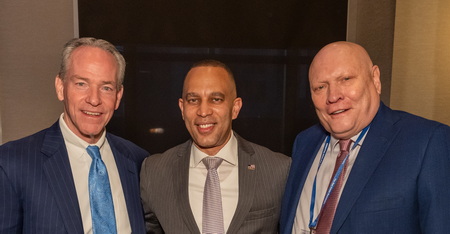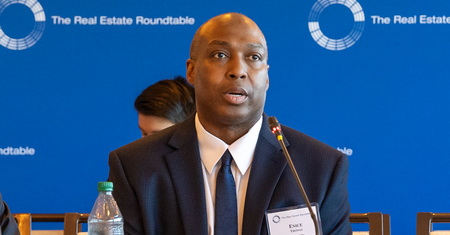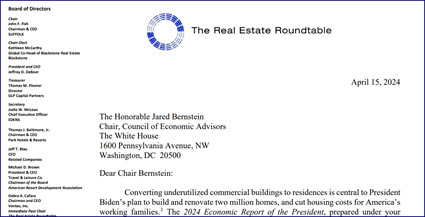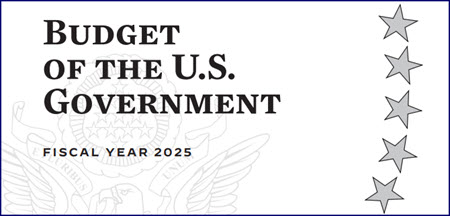
This week’s Real Estate Roundtable meeting focused on national policies impacting commercial real estate, with an emphasis on the economy, the need for increased federal support for property conversions, and capital and credit issues. Guests such as House Democratic Leader Hakeem Jeffries (D-NY) and other prominent policymakers also discussed the housing crisis, return-to-office issues, and the upcoming elections. (The Roundtable’ Spring 2024 Policy Priorities and Executive Summary)
Speakers & Policy Issues





Next on The Roundtable's meeting calendar is the all-member Annual Meeting on June 20-21 in Washington, DC, which will also feature meetings of RER’s Policy Advisory Committees.
# # #

The Real Estate Roundtable urged the Biden administration to take a series of actions to support commercial-to-residential property conversions in an April 15 letter to Jared Bernstein, chair of the White House Council of Economic Advisors. (see Meeting story above)
Improving Agency Resources
Roundtable Recommendations

The Roundtable will continue to coordinate with White House staff and encourage modifications to federal regulations and laws that can improve CRE conversion projects.
# # #

A group of Senate Democrats introduced legislation this week that would tax carried interest capital gains income at ordinary income tax rates of up to 40.8%. (Bloomberg Tax April 16)
Carried Interest Proposals
Democratic Proposals

The Tax Cuts and Jobs Act of 2017 created a three-year holding period requirement for carried interest to qualify for the reduced 20% long-term capital gains rate.
# # #

Dual Republican House and Senate resolutions introduced this week take aim at the recent climate risk disclosure rule from the U.S. Securities and Exchange Commission (SEC). As the 2024 election season gets underway, the resolutions delineate the parties’ different views on climate policy and their clashing perspectives on the scope of agencies’ regulatory authority. (Senate and House resolutions | PoliticoPro, April 17)
Political Differences
Legal Pause in Effect

If the SEC’s rule eventually takes effect, registered companies would have to include certain climate-related disclosures in annual Form 10-Ks. Notably, the final SEC rule did not include Scope 3 disclosures, which affirmed a position strongly advocated by The Roundtable. (Roundtable Fact Sheet, March 12 and Roundtable Weekly, March 8)
# # #